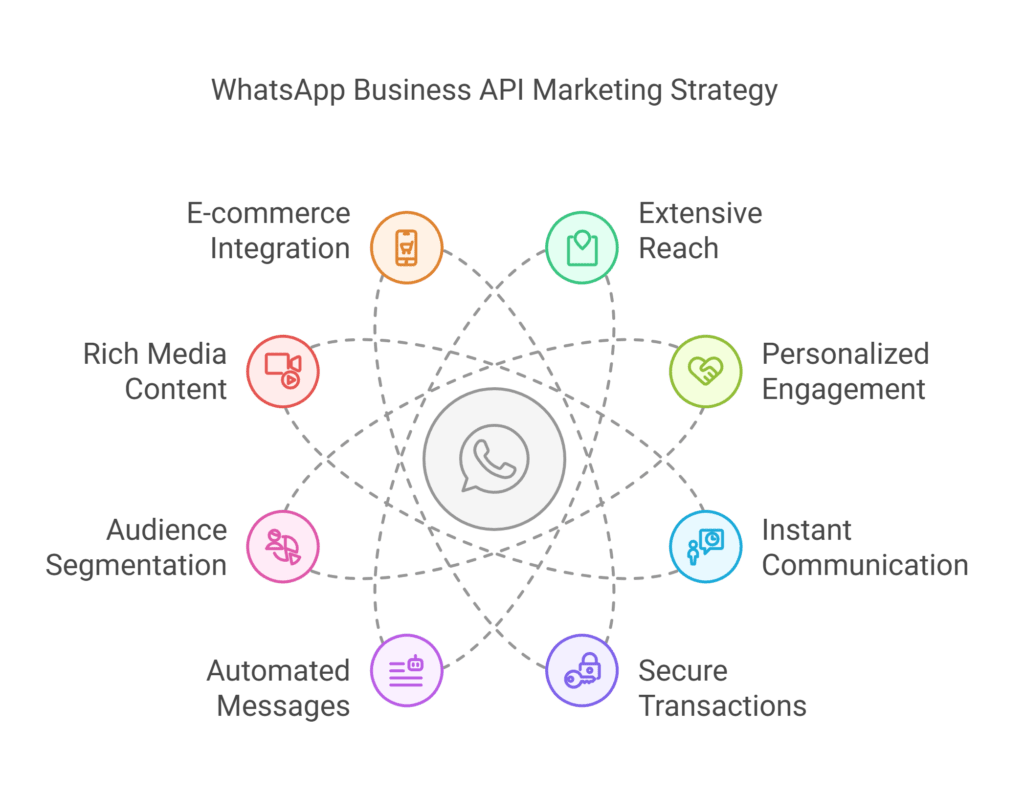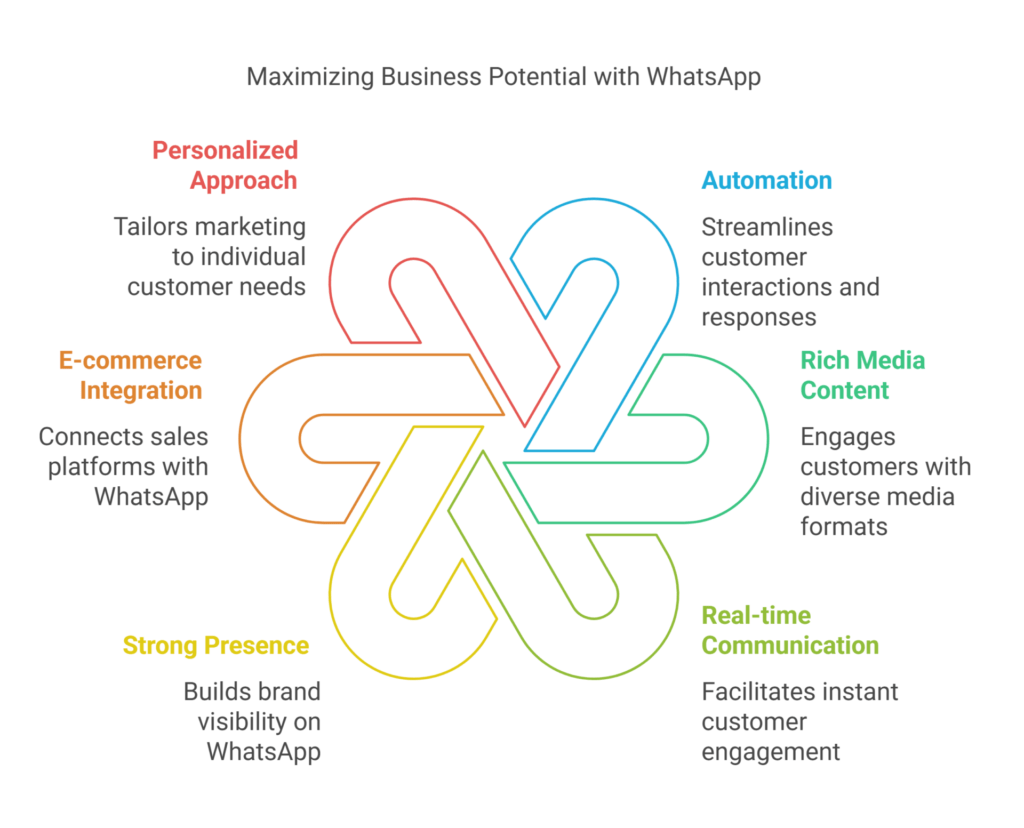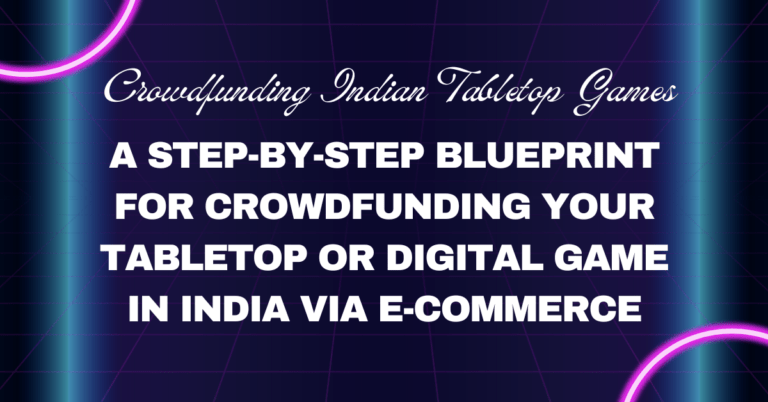How to Do Marketing through WhatsApp Business API and Increase Sales in India
WhatsApp Business API Marketing
With the current digital era, companies are always seeking new means of reaching their target market effectively. With over 487 million users, India is the biggest market for WhatsApp. WhatsApp is no longer a messaging platform; it has evolved into a business powerhouse, courtesy of the WhatsApp Business API.
Here we will explore ways in which a business can take advantage of using the WhatsApp Business API for business marketing and improving sales in India.
WhatsApp Business API Marketing

Why WhatsApp Business API?
WhatsApp Business API enables businesses to send automated, personalized messages in bulk, and deliver a seamless customer experience. In contrast to the standard WhatsApp Business app, the API supports more advanced features that are appropriate for larger-scale businesses and also allows them to connect WhatsApp to their CRM, e-commerce, and customer service platforms.
Here’s why WhatsApp Business API is a game-changer for businesses in India:
- Extensive Reach: With over 487 million active users, WhatsApp is the most popular messaging app in India, making it the ideal platform to reach potential customers.
- Personalized Customer Engagement: It allows businesses to engage with customers in a one-on-one, personalized manner, enhancing customer loyalty and retention.
- Instant Communication: WhatsApp offers real-time messaging, which means businesses can respond to customer inquiries, concerns, and orders instantly.
- Secure Transactions: WhatsApp ensures secure communication through encryption, providing trust and safety for businesses and customers alike.
- Automated Messages: The API enables businesses to automate routine interactions, ensuring consistency while saving time and resources.
How to Use WhatsApp Business API for Marketing in India
1. Set Up Your WhatsApp Business API Account
The first step is to apply for the WhatsApp Business API through a WhatsApp Business Solution Provider (BSP). This can be a third-party provider like Interckt, AISensy, Tata Telecommunications, Wati, Twilio, MessageBird, or Zoko, or you can work directly with WhatsApp through their official API partners. You’ll need to provide details about your business, including the company name, website, and intended use case.
Once you are approved, you will gain access to an API token that allows you to start sending messages to your customers.
2. Create a WhatsApp Business Profile – WhatsApp Business API Marketing
Your business profile on WhatsApp should be professional, informative, and consistent with your brand identity. You can add your logo, company details, business hours, and a brief description of your products or services. This helps customers identify and trust your business.
3. Segment Your Audience – WhatsApp Business API Marketing
For effective marketing, you need to understand your audience. WhatsApp Business API allows you to segment your contacts based on categories like location, purchase behaviour, and customer interactions. This segmentation enables businesses to tailor messages and campaigns to the specific needs of each customer group.
4. Automate Messages for Better Engagement – WhatsApp Business API Marketing
Automation is one of the key features of the WhatsApp Business API. Businesses can automate responses to frequently asked questions, send appointment reminders, or provide order confirmations. Additionally, you can set up chatbots to handle simple queries and provide instant support.
For instance, if you run an e-commerce business, you can automate a welcome message for new customers, send order updates, or promote flash sales to your customer list. Automation helps you save time and deliver consistent communication.
5. Broadcast Messages to Promote Offers and Discounts – WhatsApp Business API Marketing
WhatsApp Business API allows you to send bulk messages (with customer consent) to promote offers, discounts, or new products. However, be mindful of the quality of your content. Customers are more likely to engage if the messages are relevant, concise, and provide clear calls to action.
For example:
- Send personalized offers to loyal customers.
- Notify customers about new arrivals or limited-time discounts.
- Share updates on delivery and shipping for existing orders.
6. Interactive and Rich Media Content – WhatsApp Business API Marketing
WhatsApp Business API supports rich media like images, videos, documents, and links. You can use these formats to enhance your marketing campaigns. Create visually appealing content such as product catalogs, promotional videos, and tutorials. For instance, sending a video showcasing how your product works could spark customer interest and increase sales.
7. Integrate WhatsApp with Your E-commerce Platform – WhatsApp Business API Marketing
Businesses in India can integrate WhatsApp Business API with their e-commerce platforms. This allows customers to place orders directly through WhatsApp, making the entire shopping experience more convenient.
For example:
- Send a WhatsApp message with a product catalog and a “Buy Now” button.
- Allow customers to make inquiries and complete purchases through the app.
- Send order confirmations, payment links, and shipping details.
8. Provide Exceptional Customer Support – WhatsApp Business API Marketing
WhatsApp is an excellent tool for offering personalized customer service. By using the API, businesses can offer round-the-clock support, resolve issues quickly, and enhance customer satisfaction. Fast response times are crucial in the competitive Indian market, and WhatsApp enables businesses to engage customers in real-time.
9. Leverage WhatsApp Groups for Community Building – WhatsApp Business API Marketing
WhatsApp groups can be an excellent way to build a community around your brand. Invite your customers to exclusive groups where they can interact with each other and learn more about your products or services. You can also use groups to host events, announce new launches, and offer exclusive discounts to members.
How to Increase Sales in India Using WhatsApp Business API
1. Localization
India is a diverse country with multiple languages and regional preferences. To tap into the local market, consider localizing your messages by using regional languages, addressing local festivals, and customizing your content to suit the cultural context. WhatsApp Business API allows you to send messages in multiple languages, which can increase customer engagement.
2. Targeting Smaller Cities
While major cities like Delhi, Mumbai, and Bangalore are often the focus of businesses, the true growth potential in India lies in tier 2 and tier 3 cities. WhatsApp is widely used even in these smaller cities, and businesses can connect with a larger, untapped audience. Use WhatsApp to target these cities with localized offers and marketing campaigns.
3. Utilize Customer Reviews and Feedback
Customer reviews play a vital role in India’s purchasing decisions. After each successful transaction, ask your customers to provide feedback via WhatsApp. This helps build trust with potential customers, and positive reviews shared within WhatsApp groups can boost your brand’s reputation.
4. Offer Payment Integration via WhatsApp
With UPI (Unified Payments Interface) growing rapidly in India, businesses can integrate payment options directly through WhatsApp. By allowing customers to make payments via WhatsApp, you create a seamless and convenient experience, making it easier for customers to complete their purchase and boosting sales.
5. Leverage WhatsApp Status for Promotion
WhatsApp Status is a great way to broadcast time-sensitive promotions. Since status updates appear at the top of the chat list, they are visible to all your contacts. You can post limited-time offers, event invitations, or behind-the-scenes content to keep your audience engaged and entice them to take action.
Conclusion – WhatsApp Business API Marketing
The WhatsApp Business API is a powerful tool for businesses in India, offering unmatched reach and an effective way to engage customers directly. By leveraging its features like automation, rich media content, and real-time communication, you can create personalized marketing campaigns that resonate with your audience.
By building a strong WhatsApp presence, integrating your e-commerce system, and personalizing your approach, you can significantly boost your sales in the Indian market. Don’t underestimate the power of WhatsApp as a marketing channel—embrace it, and watch your business thrive!

1. What is WhatsApp Business API?
The WhatsApp Business API is a tool designed for medium and large businesses to communicate with their customers at scale. It allows businesses to send automated, personalized messages, integrate with CRMs, and offer better customer support through WhatsApp, a platform used by millions of people globally.
2. How is WhatsApp Business API different from the regular WhatsApp Business app?
The WhatsApp Business app is designed for small businesses with fewer customers, while the WhatsApp Business API is meant for larger businesses that need to handle a higher volume of messages. The API allows for automation, integration with third-party tools, and more advanced features like bulk messaging, while the regular app doesn’t offer this level of flexibility.
3. How can I set up WhatsApp Business API for my business?
To set up the WhatsApp Business API, you need to apply through a WhatsApp Business Solution Provider (BSP) or work directly with WhatsApp. After approval, you’ll receive an API token and can integrate the API with your CRM and e-commerce platforms for automated messaging and customer interactions.
WhatsApp Business API Marketing
4. Can I automate responses using WhatsApp Business API?
Yes, automation is one of the core features of WhatsApp Business API. You can set up automated responses for frequently asked questions, order confirmations, shipping updates, and more. Additionally, you can integrate chatbots to handle routine inquiries and provide instant customer support.
5. How can I use WhatsApp to send promotional messages to customers?
WhatsApp Business API allows you to send bulk messages to customers who have opted in, promoting offers, new products, discounts, and more. However, make sure your messages are relevant and personalized to prevent spamming your contacts. Offering value and clear calls to action will improve engagement.
6. Can I send rich media content through WhatsApp Business API?
Absolutely! WhatsApp Business API supports rich media content such as images, videos, documents, and links. This allows you to create visually appealing marketing campaigns, share product catalogs, promotional videos, and even tutorials to engage your audience.
WhatsApp Business API Marketing
7. How does WhatsApp Business API help with customer support?
WhatsApp Business API enhances customer support by enabling businesses to respond to customer inquiries instantly, resolve issues quickly, and provide personalized assistance. Since WhatsApp allows real-time communication, customers are more likely to engage with businesses that offer timely and efficient support.
8. How can I increase sales in India using WhatsApp Business API?
To increase sales in India, businesses can:
- Localize your messages to cater to regional languages and cultural preferences.
- Target smaller cities and rural areas where WhatsApp is widely used.
- Integrate payment options like UPI, allowing customers to make seamless payments directly through WhatsApp.
- Utilize WhatsApp Status to promote time-sensitive offers and engage your audience.
- Request customer reviews via WhatsApp to build trust and credibility.
WhatsApp Business API Marketing
9. Can I integrate WhatsApp Business API with my e-commerce platform?
Yes, you can integrate WhatsApp Business API with your e-commerce platform. This enables customers to browse product catalogs, place orders directly through WhatsApp, receive order updates, and track shipments, making the shopping experience more seamless and increasing conversion rates.
10. What are the best practices for marketing on WhatsApp Business API in India?
Some best practices include:
- Segmenting your audience to send personalized messages.
- Automating messages to handle routine tasks and save time.
- Using WhatsApp groups to create a community around your brand.
- Offering localized content to cater to regional preferences.
- Maintaining a professional and friendly tone in customer interactions.
WhatsApp Business API Marketing
11. Is WhatsApp Business API secure for financial transactions?
Yes, WhatsApp provides end-to-end encryption for all communications, ensuring that messages, including payment details, are secure. Integrating payment gateways like UPI can also allow for safe and seamless transactions through WhatsApp.
12. How do I collect feedback or reviews through WhatsApp?
After a successful transaction or interaction, you can ask customers to provide feedback via WhatsApp. You can send them a quick message or survey asking for their review. Positive reviews can be shared in WhatsApp groups or displayed on your website to build trust with potential customers.
WhatsApp Business API Marketing
13. Can I create a community on WhatsApp for my business?
Yes, WhatsApp groups can be a great way to build a community around your brand. You can invite customers to exclusive groups where they can receive updates, interact with your brand, and access special offers. This fosters engagement and helps build a loyal customer base.
14. How do I avoid being labeled as spam while using WhatsApp for marketing?
To avoid being labeled as spam, ensure you:
- Have explicit consent from customers before sending them promotional messages.
- Send personalized, relevant, and value-driven content.
- Maintain a balance between marketing messages and customer service interactions.
- Avoid sending unsolicited messages to large groups of people who have not opted in to receive communications.
15. How do I track the effectiveness of my WhatsApp Business marketing campaigns? WhatsApp Business API allows you to track the delivery status, read rates, and response times for your messages. You can also integrate it with analytics tools to measure customer engagement and conversion rates, allowing you to optimize your marketing efforts and improve sales.
Thanks for reading this blog. Please share your suggestions.







One Comment